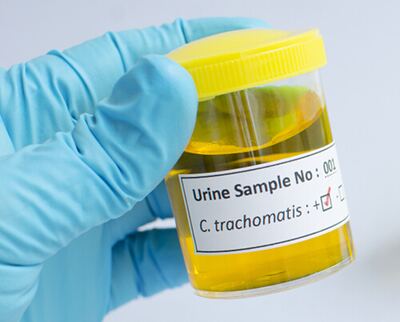How long does a chlamydia test take?
Chlamydia is one of the most common sexually transmitted infections (STIs) that can infect both men and women. It is caused by a bacterial infection called chlamydia trachomatis that is spread through unprotected vaginal, oral, or anal sex with an infected person.
Through the National Chlamydia Screening Programme in 2018, more than 1.3m chlamydia tests were carried out among young people, aged between 15 and 24 years old. 134,418 people, equating to 10% of those tested, were diagnosed as positive. This represents a 2% increase in diagnoses between 2018 and 2019.
What is a Chlamydia Test?
 A chlamydia test is used to determine if you have chlamydia bacteria, known as chlamydia trachomatis, in your body. Testing for chlamydia involves:
A chlamydia test is used to determine if you have chlamydia bacteria, known as chlamydia trachomatis, in your body. Testing for chlamydia involves:
- A swab test - where a small cotton bud is wiped inside the vagina and/or anus.
- A urine sample needs to be collected at least one or two hours after you last urinated.
If you have a high chance of having chlamydia, then you may be advised to start treatment even before you get the results. This is usually the case when:
- You or your partner has shown any symptoms of the infection.
- Your partner has already been diagnosed with chlamydia, and you have had unprotected sex or sexual contact.
Chlamydia tests are free at doctors' surgeries, sexual health clinics and hospitals.
If you don't have the time to go to a sexual health clinic, you can buy chlamydia testing kits online.
At Prescription Doctor, we offer two different types of tests that specifically look for Chlamydia.
The chlamydia home testing kit can be used by both men and women. The kit contains everything you need to acquire a sample and post it to our partnered laboratory, including a prepaid envelope. Mail your sample to our lab, and your results will be made available through your Prescription Doctor account within 72 hours of the lab receiving the sample.
We also offer the SELFCheck Female Chlamydia Test, which provides results in 15 minutes. With the SELFCheck Female Chlamydia Test, you don't need to send a sample off to a lab. Each SELFCheck test comes with detailed instructions on how to use the test and interpret the results.
If you are considering getting tested for chlamydia, bear in mind that the test will not tell you how long you have had it for. As the infection is asymptomatic, you could have had it for months or years without realising. Furthermore, depending on how many sexual encounters you have had, it is difficult to trace the infection back to one person.
How is Chlamydia Treated?
Fortunately, chlamydia is easy to treat with oral antibiotics. The two most commonly prescribed antibiotics for chlamydia are:
It can take up to one week for the antibiotics to take effect, and you will start to notice that your symptoms clear up during this time. While you are taking the antibiotics, you should avoid having sex or any sexual contact, as you could still be contagious; therefore, you could pass the infection to your partner.
If any of the symptoms persist, you should consult your doctor for further guidance.
When Should You Take a Chlamydia Test?
It is crucial that you do not delay going for a test if you suspect you may have chlamydia. If you have had unprotected vaginal, oral, or anal sex, it is best you get yourself tested as soon as possible. Other reasons why you should think about getting tested for chlamydia include:
- You or your partner starts to show signs/symptoms of chlamydia.
- You or your partner has had unprotected sex with other people.
- You have had unprotected sex with a new partner.
- Your partner tells you they currently have an STI.
- You are pregnant or planning to become pregnant.
- You notice a condom has split during sex.
What Do The Test Results Mean?
The results of the chlamydia test will typically be available within 7 to 10 days. You can expect either a:
- Positive test result – that means you are infected with chlamydia and will need antibiotics to treat it. You will need to let your current and any recent sexual partners know so that they can also be tested for chlamydia.
- Negative result – that means no STI was found, and no further action is required.
How Serious is Chlamydia?
If chlamydia is left untreated, the infection can spread to other parts of the body and potentially cause long-term health problems. Also, the more times you get chlamydia, the more likely you are to get further health complications. In women, the complications of chlamydia include:
- Pelvic inflammatory disease, a complication that causes scarring of the fallopian tubes.
- Fertility problems.
In men, the complications include:
- The infection spreads to the tube that carries sperm from the testicles, causing painful inflammation.
- Reactive arthritis.
How to Prevent Getting Chlamydia?
The most effective way to prevent catching chlamydia is to abstain from all sexual activities. However, this is not realistic; therefore, aim to practice safe sex and take care of your sexual health by:
- Use condoms consistently - during all your sexual contact, always use a condom to help reduce the risk of infection, risk of pregnancy and the spread of STIs.
- Limit how many sexual partners you have – if you have multiple partners, it puts you at a high risk of contracting chlamydia as well as other STIs.
- Get yourself tested regularly – if you are sexually active, then get tested every year or when you change sexual partners.
Authored & Reviewed By

Mohamed Imran Lakhi
MPharm - Lead PharmacistPublished on: 13/08/2019 Reviewed on: 05/06/2025
© 2013 - 2026 Al Muhsineen Limited. All Rights Reserved. Registered Pharmacy: 34 Halliwell Road, Bolton BL1 8RL. Registered Office: 254 First Floor, Shearbrow, Blackburn, England, BB1 8DS





